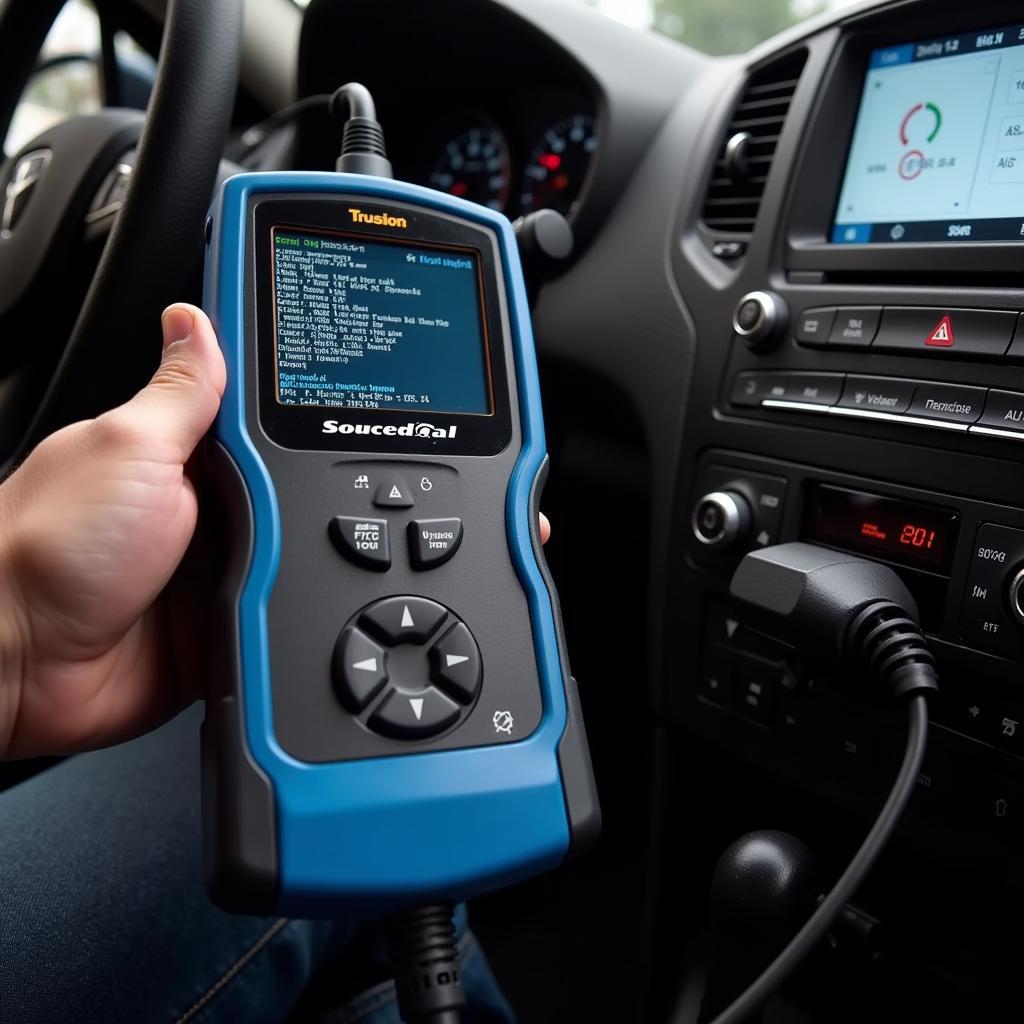Modern Medical Diagnostic Tools are transforming the automotive repair industry, providing mechanics with unprecedented insight into vehicle health. Just as doctors rely on advanced equipment to diagnose human ailments, modern mechanics are leveraging sophisticated diagnostic tools to identify and rectify automotive issues with speed and precision.
These tools go beyond basic code readers, offering a comprehensive analysis of a vehicle’s electronic systems, often pinpointing problems that would be difficult or impossible to diagnose with traditional methods. This translates to faster repairs, reduced downtime, and ultimately, happier car owners.
The Evolution of Automotive Diagnostics: From Guesswork to Precision
Gone are the days when mechanics relied solely on their senses and experience to diagnose car problems. The evolution of automotive technology, particularly the proliferation of electronic control units (ECUs), has necessitated equally sophisticated diagnostic tools.
Early diagnostic tools were rudimentary, often limited to reading basic engine codes. However, modern medical diagnostic tools have ushered in a new era of automotive diagnostics, characterized by:
- Comprehensive System Coverage: These tools can access and analyze data from multiple ECUs, including engine, transmission, ABS, airbags, and more.
- Real-Time Data Monitoring: Mechanics can monitor live data streams from various sensors, providing insights into system performance under different operating conditions.
- Advanced Diagnostic Capabilities: Beyond reading codes, these tools offer functionalities like bi-directional control, allowing mechanics to interact with and test individual components.
The Arsenal of Modern Medical Diagnostic Tools in Auto Repair
Modern auto repair shops resemble high-tech medical facilities, equipped with an arsenal of advanced diagnostic tools. Some of the most common include:
-
Scan Tools: These are the workhorses of automotive diagnostics, connecting to the vehicle’s OBD-II port to read and clear diagnostic trouble codes (DTCs). Advanced scan tools offer functionalities like live data streaming, component actuation, and special functions for specific vehicle makes and models.
-
Oscilloscope: This tool allows mechanics to visualize electrical signals within a vehicle’s systems, aiding in the diagnosis of complex issues related to sensors, actuators, and wiring harnesses.
-
Digital Multimeter: A staple in any mechanic’s toolbox, the digital multimeter measures voltage, current, and resistance, helping diagnose electrical faults and verify component operation.
-
Video Inspection Camera: These cameras provide a visual inspection of hard-to-reach areas, such as inside engines, transmissions, and body panels, aiding in the detection of leaks, damage, and corrosion.
-
Pressure and Vacuum Testers: These tools measure pressure and vacuum levels in various systems, including fuel, cooling, and brake systems, helping diagnose leaks, blockages, and other related problems.
Benefits of Modern Medical Diagnostic Tools in Auto Repair
The adoption of modern medical diagnostic tools has yielded significant benefits for both auto repair businesses and car owners, including:
Increased Accuracy and Efficiency
These tools eliminate much of the guesswork traditionally associated with car repair, enabling mechanics to pinpoint problems quickly and accurately. This translates to faster repairs, reduced labor costs, and increased customer satisfaction.
Reduced Downtime and Repair Costs
Accurate diagnosis means less time spent troubleshooting, resulting in shorter repair times and lower labor costs for vehicle owners. Moreover, identifying issues early on can prevent minor problems from escalating into major (and costly) repairs.
Enhanced Safety and Reliability
By enabling the early detection and resolution of potential safety hazards, modern medical diagnostic tools contribute to safer and more reliable vehicles on the road.
“The use of modern diagnostic tools is no longer optional for successful auto repair businesses,” says John Smith, a veteran mechanic and automotive instructor. “These tools are essential for keeping pace with the increasing complexity of modern vehicles and meeting the demands of today’s tech-savvy customers.”
 Mechanic Using Scan Tool on Car
Mechanic Using Scan Tool on Car
The Future of Automotive Diagnostics: Embracing the Digital Age
As vehicles become increasingly connected and autonomous, the role of modern medical diagnostic tools in auto repair will only continue to grow. We can anticipate further advancements in areas like:
-
Predictive Diagnostics: Using artificial intelligence and machine learning, future diagnostic tools could predict potential problems before they even arise, enabling proactive maintenance and minimizing the risk of breakdowns.
-
Remote Diagnostics: Imagine a future where your car could self-diagnose problems and transmit the data to your mechanic, who could then order parts and schedule repairs remotely.
-
Augmented Reality (AR) and Virtual Reality (VR): AR and VR technologies could be integrated into diagnostic tools, providing mechanics with interactive, real-time guidance during repairs.
Partner with ScanToolUS for Cutting-Edge Automotive Diagnostic Solutions
At ScanToolUS, we offer a comprehensive range of modern medical diagnostic tools to empower mechanics and car owners alike. Contact us today at +1 (641) 206-8880 or visit our office at 1615 S Laramie Ave, Cicero, IL 60804, USA to explore our latest offerings and take your automotive diagnostics to the next level.
FAQs About Modern Medical Diagnostic Tools in Auto Repair
1. Are modern diagnostic tools compatible with all car models?
While most modern cars are equipped with the OBD-II port, the specific diagnostic capabilities and functionalities may vary depending on the vehicle’s make, model, and year. It’s always recommended to consult the tool’s documentation or contact the manufacturer to ensure compatibility.
2. Do I need specialized training to use these tools?
While basic operation of some tools might be straightforward, a comprehensive understanding of automotive systems and diagnostic principles is crucial for accurate interpretation of data and effective troubleshooting. There are various training courses and certifications available for aspiring automotive technicians.
3. Can I use modern diagnostic tools for DIY car repair?
While some DIY enthusiasts might find these tools helpful, it’s important to remember that car repair can be complex and potentially dangerous. Unless you have the necessary expertise, it’s always advisable to leave complex diagnostics and repairs to qualified professionals.
